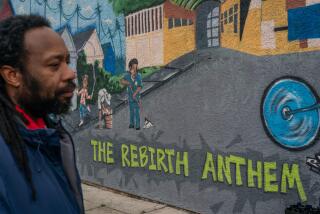Oakland site cleared, but protest lives
Just 12 hours after police dismantled the Occupy Oakland tent city in a peaceful predawn raid, about 700 protesters returned to the civic center plaza Monday evening, vowing to keep their movement alive but undecided about whether to defy police and retake the site of their monthlong protest.
“Regardless of what they do to that encampment, this awoke something in all of us,” said Iris Arcenciel, 26, of Alameda, a member of Occupy Oakland’s media committee who advocated for retaking the plaza. “The important thing to remember is civil disobedience.”
Protesters kept talking late into the evening Monday, planning their next moves as police officers stood by and vans filled with law enforcement backup waited around the block, poised for problems. Most protesters leaned toward re-occupying the plaza while others pressed for taking over foreclosed buildings.
Unlike recent Occupy Oakland efforts, the demonstration was not marred by violence.
Thirty-two protesters who refused to leave the encampment after they were ordered to disburse were taken into custody in the early morning darkness Monday by officers in riot gear. One more was arrested later in the day on charges of spitting at police.
In their second attempt to evict Occupy Oakland from the civic center plaza since it was erected Oct. 10, officers from about a dozen agencies gathered at 2 a.m. Their staging area was the Oakland-Alameda County Coliseum, about seven miles away.
By 5 a.m., they were at Frank H. Ogawa Plaza, the heart of downtown Oakland, dismantling tents and arresting protesters. Streets surrounding the civic center were blocked. Downtown Oakland awoke to helicopters hovering.
Protesters were warned that “absolutely no lodging” would be permitted on city property moving forward. By daylight, the plaza had been cleared of live-in demonstrators. Tents — minus their poles — sagged in the former encampment that once was home to hundreds.
A lone protester remained perched on a jerry-built platform in a tree near City Hall, as public works employees in white jumpsuits cleared out the detritus — more than 36 tons by day’s end. “We’re just ignoring him,” one Oakland police officer said. “When he gets tired, he’ll come down.”
But other protesters have vowed to keep Occupy Oakland alive. One man held an oversized sign that commanded, “Re-OCCUPY ASAP.”
A return to the plaza “goes without saying,” said Lauren Smith, 29, of Concord. “They’re not going to be able to keep this clear.”
After touring the encampment with an exhausted Mayor Jean Quan, interim Police Chief Howard Jordan told reporters at an early morning news conference that no protesters or officers had been injured in what the city described as the “decampment.” Only nine of those arrested had Oakland addresses, he added.
Police originally evicted Occupy Oakland demonstrators Oct. 25, but Quan allowed the camp to be rebuilt. The veteran liberal activist has been a lightning rod for anger from all sides since then — including within her own administration.
By Monday evening, an unpaid advisor and a deputy mayor had both resigned.
But at the early morning news conference, she said she meant business. Campers had been served with eviction notices for three days running, and now they had to leave permanently.
The Occupy Oakland encampment “was no longer about abuses of the financial system or foreclosures or the unemployed,” she said during the news conference, noting that it had become cemented in many people’s’ minds as a “place of violence” after fires, assaults and a shooting death Thursday.
“We had to bring the camp to an end before more people were hurt,” Quan said, issuing a plea to protesters throughout the region: “We’re asking everyone to respect my city’s decision to close the encampment, even if we support the movement.”
Public safety was the main reason the camp was closed, she said. But the drain on Oakland’s dwindling resources could not be ignored.
The morning raid cost the city $500,000 in outside police help. Occupy Oakland’s total cost to taxpayers to date is more than $2.4 million, according to a city estimate released late in the day.
And the drain on the shrinking police force has brought additional costs. An evening protest by about 500 demonstrators Oct. 29 stretched the department so thin that nearly 200 911 calls backed up over two hours. Downtown businesses also have suffered: Customers are staying away and vandals have defaced property. In response to a poll commissioned by the Oakland Metropolitan Chamber of Commerce last week, nearly two-thirds of city residents said they believed that Occupy Oakland had harmed local businesses and workers. Most called for the camp’s ouster.
The city of Eureka, Calif., nearly 300 miles north, also lost patience with its Occupy encampment Monday — moving in to clear out the small cluster of tents before daybreak. It was Eureka’s second eviction effort as well. An earlier raid was followed by rebuilding.
But on Monday, officers from several agencies cleared out the tents and arrested 33 protesters at the Eureka civic center. Over the weekend, police also moved on protesters in Portland, Ore., Salt Lake City, Denver and Albany, N.Y.
“They’re welcome to protest 24/7 on the sidewalks, in front of City Hall or anywhere else,” Eureka Mayor Frank Jager said. “But we’re not going to allow them to camp out.”
lee.romney@latimes.com
More to Read
Start your day right
Sign up for Essential California for news, features and recommendations from the L.A. Times and beyond in your inbox six days a week.
You may occasionally receive promotional content from the Los Angeles Times.








